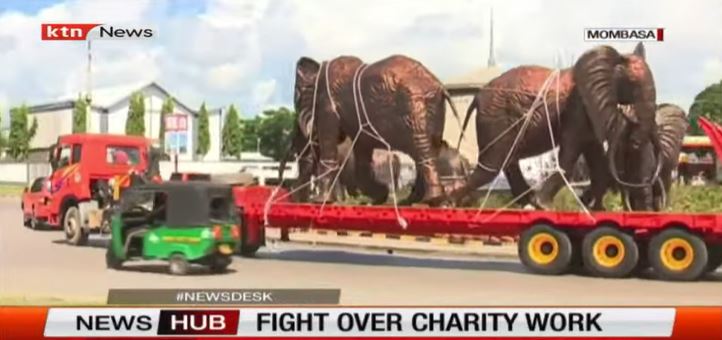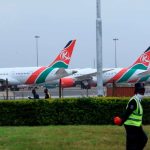Mombasa ‘s iconic wildlife sculptures were removed from key locations in the island city on Wednesday.
This follows a row between Mombasa Cement, which used the sculptures to beautify the tourist town, and the Mombasa County Government over a controversial directive ordering the company to stop philanthropic activities at public hospitals.
Last month, the county government issued a cease and desist notice to the company’s owner, Mr Hasmukh Patel, ordering him to immediately stop his philanthropic activities and leave the patients alone.
Mr Patel has been paying the bills of patients in Mombasa’s public hospitals who are unable to pay their medical and funeral bills.
The sculptures have been installed at the city’s six main roundabouts, particularly in the central business district.
The Makupa, Lebanon, Digo Road, Nyerere, Port and Ganjoni roundabouts have crocodile, buffalo, shark, camel and lion sculptures.
Mombasa Cement took on the project after years of neglect left the roundabouts an eyesore for tourists and local residents.
The roundabouts had been turned into illegal dumpsites, but the private operator, in collaboration with the previous county government, rehabilitated them and turned them into tourist attractions with beautiful scenery.
The project created jobs for many young people, who were employed to clean the roundabouts and guard the solar panels that power them.
The company employed an artist to make the sculptures in Nairobi before they were ferried to Mombasa. An elephant sculpture costs Sh500,000, she said in an earlier interview.
The company’s decision will also see the removal of wild animal sculptures from the famous Kibarani Recreational Park, a big tourist attraction.
Kibarani is the gateway into the city, linking Mombasa Island to the mainland.
On Wednesday, however, the cement company announced that it was moving the sculptures to the neighbouring Kilifi County.
“We have had discussions with the Kilifi County government and Governor Gideon Mung’aro is open to the idea of us moving the sculptures. We are excited about the new partnership,” said Mr Imtiaz Sayani, the company’s community relations officer.
In a veiled attack on the county government, company officials present during the move, which is expected to take a month, blamed “water shortages”.
Tudor MCA Samir Baloo, in whose ward are the famous Makupa elephants, described the ongoing tussle between the company and the Mombasa County government as a “friendly scuffle”.
“This is a normal dispute, just like in any household where a man and a woman have a dispute. We have no problem with the Mombasa County Government, we are working with them and if there is any problem, it will be resolved,” said Mr Baloo.
Mr Sayani said the company’s free feeding programme in Mombasa would continue, but declined to comment on the order to stop paying bills for patients in the county’s public hospitals.
Last week, the Mombasa High Court halted the implementation of an order preventing Mombasa Cement from assisting patients unable to pay hefty bills at the Coast General Teaching and Referral Hospital.
Justice Olga Sewe granted an urgent application to quash the county’s directive and allowed a lobby group to apply for a court order permanently suspending a memo communicating the directive.
“I am satisfied that the application has merit. Accordingly, directions are hereby given that the applicant be and is hereby granted leave to apply for judicial review. The leave so granted shall operate as a stay of the implementation of the directive contained in the memo to the heads of the Department of Health dated April 20, 2023,” the judge said.
County Executive for Health Swabah Ahmed sent a communication to the chief officers of Medical Services and Coast General, instructing them that no donation or financial assistance should be sought or given to any health facility in the county.
Records show that Mr Patel, through his company Mombasa Cement, is spending up to Sh2 million daily to release patients stranded at the main hospital and other facilities in the county due to unpaid bills.



